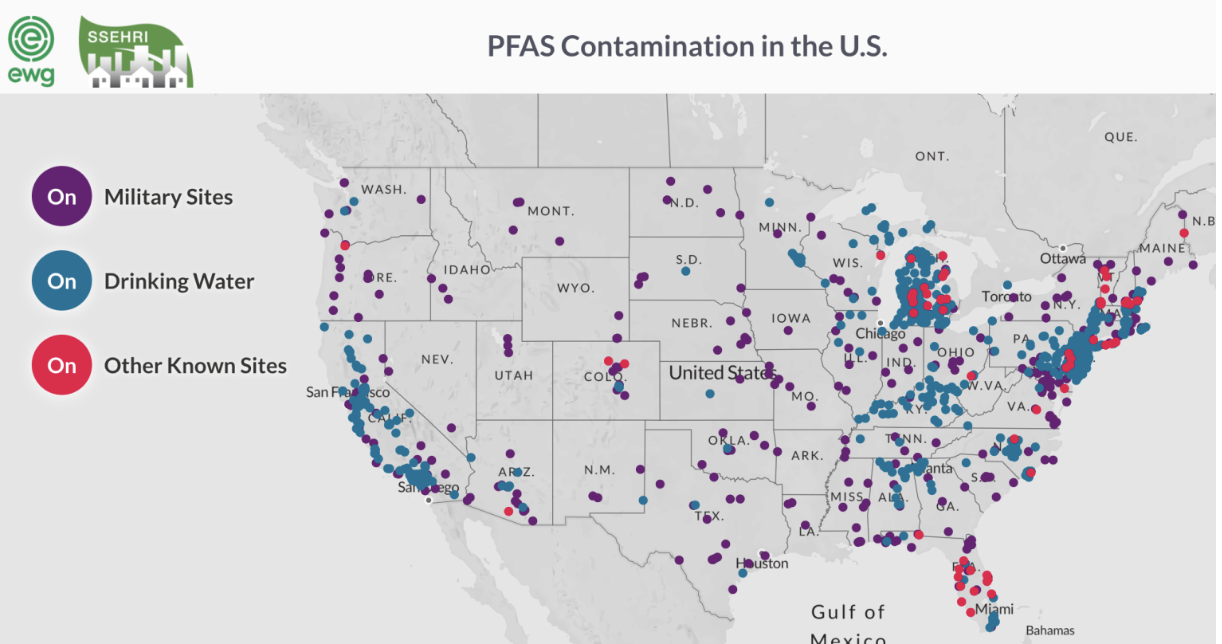
PFAS Map Developed by Northwestern University
Per- and poly-fluoroalkyl substances, or PFAS, currently plague our world. Found in countless products and across nearly every industry, these “forever chemicals” pose significant risks to human health and to the environment. The two most common PFAS, perfluorooctanoic acid (PFOA) and perfluorooctanesulfonic acid (PFOS), do not naturally degrade and remain in soil and water unless actively managed. PFAS have been found in the blood of nearly every American and increase risks of cancer, high blood pressure, fertility, growth, and development problems, and a host of other issues.
A big component of the PFAS problem is that there are still discrepancies around regulation and management. These chemicals are a major priority for the U.S. government. The Bipartisan Infrastructure Law, for example, includes set asides to address PFAS. The Environmental Protection Agency (EPA) released a roadmap last year outlining proposed research, restriction, and remediation activity and is currently developing new PFAS rules. Questions remain around how to detect and measure the chemicals in the environment, determining the amount of human exposure and the extent of chemical harms, and how to effectively remove, manage, and dispose of PFAS.
Aqueous Film Forming Foam (AFFF), a PFAS-laden fire suppressant, is heavily present on military installations around the country and thus poses a significant risk to our service members, their families, and nearby communities. AFFF has been in use by the Department of Defense (DoD) since the 1970s. DoD data released earlier this year show that many of the more than 9,000 PFAS chemicals now contaminate water supplies around at least a dozen bases across the country, at levels that are orders of magnitude higher than the EPA’s current advisory. Congress has identified 50 DoD sites deemed “highly contaminated” with PFAS, though none have begun cleanup. DoD officials report that it could be at least three decades before remediation is complete. Additional hundreds of military sites around the U.S. have either confirmed or suspected PFAS discharges that have yet to be managed.
North Carolina has seen investigations and lawsuits around the PFAS discharge into waterways and the impacts of AFFF. Out of the 700 sites under military PFAS evaluation, 11 are in the state, including North Carolina’s major bases and weapons manufacturing and transport facilities. In 2020, seven PFAS compounds were found in Fort Bragg’s water supply, and other bases around the state continue to examine contamination in water as well as soils. It is difficult to determine at present the extent of the threat that these toxins pose to our troops and their loved ones.
In 2016, the military began to warn of the potential dangers from PFAS exposure and started to move away from AFFF and other harmful products. A full AFFF phaseout was ordered by Congress in 2019, but researchers still struggle to find an effective alternative. For existing PFAS contamination, the only current management strategy for water systems is to deploy a carbon filter, and there is scant guidance or action around soil contamination. More funding, research, and regulation is necessary before the problem can truly be mitigated across the environment. But one thing is for certain – protecting our military and communities across the country requires extensive action around PFAS, and fast.
The good news is that North Carolina military and public work officials are aggressively and responsibly addressing the PFAS issue at our bases, even at the expense of completing other projects because of aggressive (and expensive) testing and remediation actions that can include removing, trucking and decontaminating soil. The North Carolina Military Business Center (NCMBC) will assist military installations with requirements for contractor support and will keep businesses aware of opportunities to assist our installations. On April 12-13, 2023, the Office of Senator Thom Tillis and NCMBC will host the annual Southeast Regional Federal Construction, Infrastructure and Environmental Summit in Wilmington, NC where we will feature a discussion on PFAS the first day. Please stay tuned for more details on this event.

Kristen Botts co-founded the program with her husband, Nathan Botts, who is a Veteran himself. Photos provided by Kristen Botts.An organization helping Veterans live a full life after their service in the U.S. Military wants to connect Veterans and d

Patrick NoblesHuntington Bancshares Incorporated announced on Feb. 2 that it has closed its merger with Cadence Bank, a regional bank headquartered in Houston, Texas and Tupelo, Miss. This strategic partnership accelerates Huntington’s growth in

There is extensive dialogue surrounding Fayetteville as a travel destination or city aimed at recruiting new businesses and new residents. As someone who moved here from out of state, I thought it could be fun to share my personal experience as